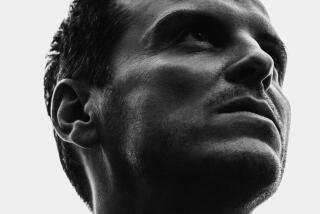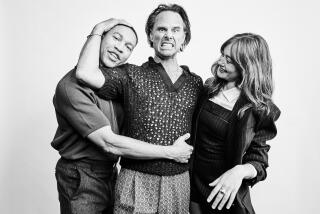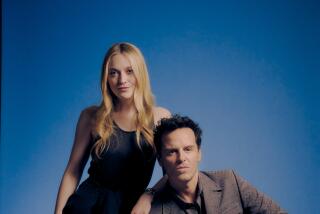Fate Is the Hunter
Fate is an angry dog that follows us down the street, a shadow that falls across the sun, a noise in the night, a rustle in the underbrush, a tapping on our shoulder.
Call it what you will, it’s that sudden, calamitous event that changes our lives, either for a moment or forever, sending us to places we’ve never imagined, at times we never expected.
I was thinking about this at a performance of “Swing” at the Music Center’s Ahmanson Theatre. It’s an exhilarating program of young dancers flying across the stage, defying both form and gravity as they leap and spin like wind sprites in a mythological clime.
And it made me sad.
Just a day earlier, I had been sitting with Tony Scott in his small Westside apartment discussing the fate that collided with his dreams on a sunny spring day on South Kingsley Avenue.
For all of his life, Scott, now 33, wanted to be a dancer. As a kid, he danced on the streets; as a student, on a stage. He won prizes and praise in his native Miami for his ability to do just what the wind sprites do in “Swing.”
It was, he would say later, “my gift from God.”
Young, strong and healthy, he came to L.A. five years ago to pursue his dream. But in April 1999, Tony Scott, destiny’s child, found himself in the wrong place at the wrong time. Fate slapped him to the ground.
*
Scott was walking his dog down a street near his home when a 60-foot palm tree fell on him. It had been dead, by some estimates, for at least two years, but why it fell at the moment Scott walked under it, no one knows. An ambient breeze, perhaps. The vibration of a passing truck.
Or a gentle push by fate.
The tree had been scheduled for removal by the city “in a couple of weeks,” said a spokesman for the Department of Public Works. But before anyone could get around to actually doing it, down it went, as silent as a whisper.
Scott has no memory of the event that left him paralyzed from the chest down. Witnesses said the roots of the tree were nothing but dust. He awoke in pain and was told he would never walk again. The falling tree had broken his neck and shattered his spinal cord.
Recently, the City Council agreed to pay him $7.6 million, accepting liability for the accident. But that wasn’t enough, and will never be enough, to buy Scott’s dream.
“Dancing was my passion, my source of existence,” he says, leaning forward in his wheelchair. “I could be happy dancing, whether or not I was being paid to do it. That’s the hardest of all to deal with, why God or the universe would destroy my passion. It was there, then suddenly. . . .”
He stops, unable to continue. His apartment, just blocks from the site of his accident, is dark and the mood heavy, a reflection of his circumstance. The dog he was walking that day, a cocker spaniel mix named Twinkie, barks from another room. Otherwise, he lives alone.
“It was so strange,” Scott says. “The tree didn’t break or snap. It just toppled.”
*
He recalls only fragments of his life during the two weeks after the accident. He remembers IVs and hospital equipment. He remembers people in his room and voices. He remembers a lady in white who taught him how to deal with pain without drugs. He remembers dreaming.
“I was told later that one doctor at County-USC Hospital said I would never walk again,” Scott remembers. “But another at Kaiser left me with the thought that miracles happen to those who want them, and who work for them.”
The result of the accident didn’t impact him at first, he says. “Somehow, I didn’t really believe I would never dance again. I never believed that it was me. I thought it was a dream. And then at Daniel Freeman Hospital, they pushed me on a gurney past a mirror. I saw it was me, and I dropped into a state of depression.”
Once accepting the reality of his condition, Scott has confronted fate on its own terms. He works out with weights five days a week and stands with a walker and leg braces three days a week. His grip is a steel clamp.
“This is my life now,” he says, “a process of getting myself together. I believe in miracles. I believe I’ll dance again.”
The belief wavers sometimes. He sees himself in the wheelchair. He remembers the pain. And he also remembers a dream he had in the drug-induced sleep of his early hospital stay, and it makes him cry. It was him in the dream. The Tony Scott that existed before fate tapped him on the shoulder. And he was dancing.
*
Al Martinez’s column appears Sundays and Wednesdays. He can be reached online at al.martinez@latimes.com
More to Read
The biggest entertainment stories
Get our big stories about Hollywood, film, television, music, arts, culture and more right in your inbox as soon as they publish.
You may occasionally receive promotional content from the Los Angeles Times.










